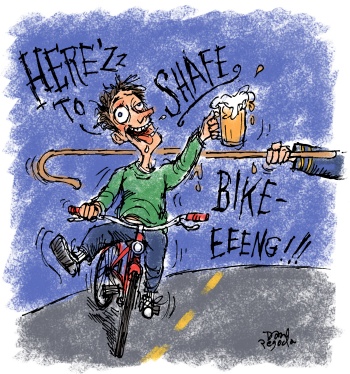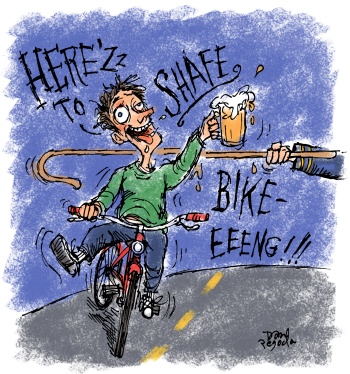Although it’s generally understood that it’s not cool to drink and drive, many people don’t think of cycling while in an altered state as being dangerous. But, before you over-indulge, here are some sobering statistics to consider…
According to NHTSA, (National Highway Transportation Safety Administration) 28% of all cyclists killed in 2009 had a measurable blood alcohol level. 24% of these had a BAC of .08% or higher. A bicyclist’s risk of a crash begins to increase significantly at 0.05% BAC and climbs rapidly after about 0.08%. In other words, when you’re a pint or two down the odds for a bicycle crash go up…sometimes way up. One study showed BAC over 0.10% increased injury risk tenfold.

It isn’t simply a matter of good sense to protect yourself (and others) from unnecessary and often self-inflicted harm, it’s expected of you. Did you know that when you travel on public right-of-way you have given your consent to field sobriety tests?
ORS 813.135 says,
“Any person who operates a vehicle upon premises open to the public or the highways of the state shall be deemed to have given consent to submit to field sobriety tests upon the request of a police officer for the purpose of determining if the person is under the influence of intoxicants…”
A bicycle operator, unlike someone driving a car, is not required to submit to a chemical test of their blood, breath or urine. However, failure or refusal to take the field sobriety tests is all that is needed for someone riding a bike to be arrested and charged with a DUII.
Speaking of DUII (driving under the influence of intoxicants), that infraction includes not just alcohol but any controlled substance (prescription drug) or inhalant. Here is the relevant Oregon statute:
813.010, Driving under the influence of intoxicants; penalty.
A person commits the offense of driving while under the influence of intoxicants if the person drives a vehicle while the person:
(a) Has 0.08 percent or more by weight of alcohol in the blood of the person as shown by chemical analysis of the breath or blood of the person made under ORS 813.100, 813.140 or 813.150; (not applicable to a bicyclist)
(b) Is under the influence of intoxicating liquor, a controlled substance or an inhalant; or
(c) Is under the influence of any combination of intoxicating liquor, an inhalant and a controlled substance.
A DUII is serious. It is not a traffic violation. It is a crime; a Class A Misdemeanor that comes with a $1,000 fine (not to mention additional court fees). If convicted, that crime becomes part of a personal record and cannot be expunged. It’s also possible that your driver’s license will be suspended (whether you have one or not. If not, you’d be having your eligibility to receive one suspended).
If charged with a DUII while riding a bicycle, you have two options: you can challenge it in court or you can opt for diversion. If eligible for diversion, you can admit guilt to the charge and enter a state program. Once completed, the criminal DUII charge and accompanying court penalties may be dropped.
But…
If your DUII offense involves a crash where someone other than yourself is physically injured or killed, diversion will not be an option.
If due to that same crash other charges are filed, diversion may get the DUII charge dropped but not the other charges.
If diversion is not completed or terminated by the court, the bicyclist will likely be convicted of the original DUII charge.
Once the diversion program has been completed, the DUII charge will be dropped but a permanent notation will be made on the driving record that the person went through a diversion program.
All in all, DUIIs are something you don’t want to tangle with.
Maturity and moderation are your best protections when it comes to altered states. Don’t ride and imbibe beyond your capacity for responsible and legal behavior.
Better yet, use mass transit or a designated biker (if you’re lucky enough to own a tandem or cargo bike!).
— Bike Law 101 appears twice a month thanks to the generous support of West End Bikes PDX (corner of 11th and SW Stark in downtown Portland). It’s written by Karen Lally and Kurt Jansen of the non-profit Animated Traffic Law Center based in Eugene, Oregon. For more info on bike law, browse the Bike Law 101 archives

